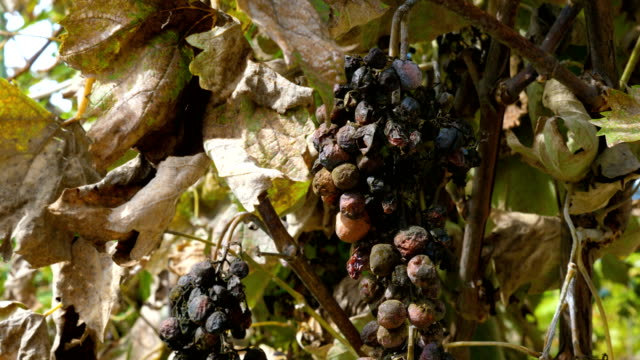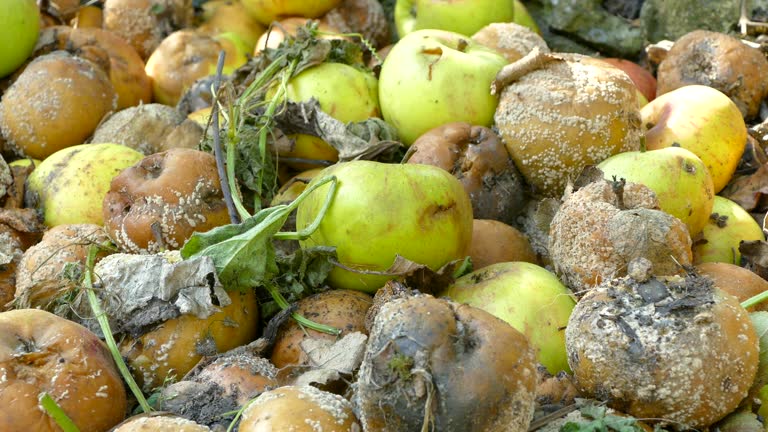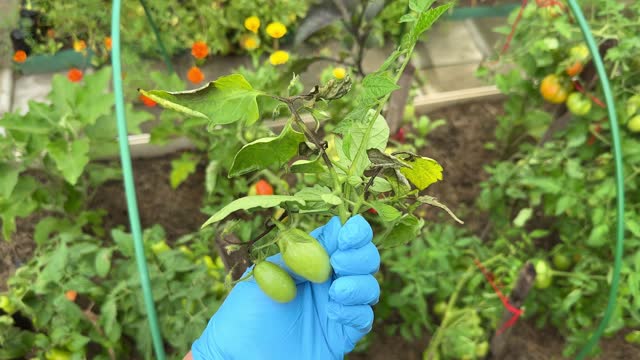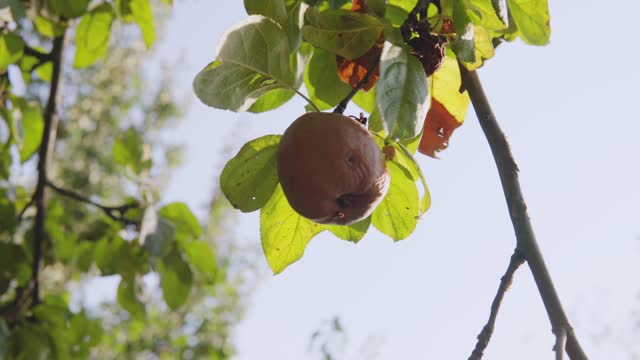
Time lapse of a banana shot over a period of 2.5 months.
Browse 960+ rotting mold fruit food stock videos and clips available to use in your projects, or start a new search to explore more stock footage and b-roll video clips.

Time lapse of a banana shot over a period of 2.5 months.

Rotting Strawberries concept

Time lapse of a fresh, juicy apple turning into disgusting, decaying, mouldy, rotting apple fruit.

Rotting strawberry timelapse isolated on white. The red fruit is getting moldy and dry. Aging process of an organism in a studio environment.

Fresh ripe green apple quickly wither to ugly brown shriveled lump. Time lapse shot, fruit isolated on black. Aging as natural process concept. Light skin change color first, then shape changed when apple dried up

Rotting Strawberries concept

Time Lapse of a slice of tomato decaying in a studio over the course of two months. Photographed every hour, White Background

Tainted cauliflower. Black mold on bad cauliflower. Improper storage of vegetables.

Orange dries up becomes moldy and rots, time lapse decay process. Spoiled harvest, world hunger. High quality 4k footage

Food waste refers to food that is discarded or not eaten. This can occur at various stages of the food supply chain, including during production, processing, distribution, and consumption. Food waste is a significant problem because it has negative environmental, economic, and social impacts. From an environmental perspective, food waste contributes to greenhouse gas emissions and other forms of pollution, as well as deforestation and other land use changes. From an economic perspective, food waste represents a waste of resources, including water, land, and energy, that were used to produce the food. From a social perspective, food waste exacerbates food insecurity and inequality, as there are many people who do not have enough to eat, yet large amounts of food are being thrown away. According to the United Nations Food and Agriculture Organization (FAO), approximately one-third of all food produced globally is lost or wasted. This represents a significant loss of resources, including water, land, and energy, as well as a significant contributor to greenhouse gas emissions. Sustainability refers to the ability to meet the needs of the present without compromising the ability of future generations to meet their own needs. In the context of food waste, sustainability means reducing food waste in order to conserve resources, reduce pollution, and improve food security. There are various strategies that can be used to reduce food waste and increase sustainability, including improving food storage and distribution, reducing portion sizes, and composting food scraps.

Blueberrys becomes dry and wrinkled. Berrys dehydrates quickly. Fast timelapse. Concept of aging, time, health, skincare, cosmetic care.

Orange dries up becomes moldy and rots, time lapse decay process. Spoiled harvest, world hunger. High quality 4k footage

Rotten moldy berries of grape affected by disease. Old dried vines and leaves.

Dolly shot, top view: Red spoiled tomatoes with rot and mold in a cardboard box. Vegetable storage rules concept

Red apple becomes dry and wrinkled. Half cutted fruit dehydrates quickly. Fast timelapse. Concept of aging, time, health, skincare, cosmetic care.

Time lapse of bananas going bad

Rotting orange tree shows effects of mold. Study agricultural implications of fungal growth on citrus. Examine methods to manage mold on citrus trees for optimal harvest. High quality 4k footage

Panning around a pile of rotting apples after falling from a tree in an orchard

Time lapse of partially pealed banana rotting in studio over a month. Shot on a white background.

Rotten apple lies under tree in garden. Farmer failed to gather all harvest in garden. It's getting bad and it smells. It reminds us that things don't last forever

Strawberry decomposing and rotting time lapse over several days. Tiny insects and mold growing on fruit.

Dangerous mold in a glass jar of red raspberry jam, rotates, close up, top view. Mold is very dangerous to health

Food waste refers to food that is discarded or not eaten. This can occur at various stages of the food supply chain, including during production, processing, distribution, and consumption. Food waste is a significant problem because it has negative environmental, economic, and social impacts. From an environmental perspective, food waste contributes to greenhouse gas emissions and other forms of pollution, as well as deforestation and other land use changes. From an economic perspective, food waste represents a waste of resources, including water, land, and energy, that were used to produce the food. From a social perspective, food waste exacerbates food insecurity and inequality, as there are many people who do not have enough to eat, yet large amounts of food are being thrown away. According to the United Nations Food and Agriculture Organization (FAO), approximately one-third of all food produced globally is lost or wasted. This represents a significant loss of resources, including water, land, and energy, as well as a significant contributor to greenhouse gas emissions. Sustainability refers to the ability to meet the needs of the present without compromising the ability of future generations to meet their own needs. In the context of food waste, sustainability means reducing food waste in order to conserve resources, reduce pollution, and improve food security. There are various strategies that can be used to reduce food waste and increase sustainability, including improving food storage and distribution, reducing portion sizes, and composting food scraps.

Rotten ripe cherry fruit hang on tree branch, damaged culture of farm diseases. Green leaf

Crops affected by Late Tomato Blight in hand. Phytophthora fungal disease which causes brown spotting on tomato leaves and fruits.

asian woman open refrigerator in kitchen and there has bad smell from salad

Spoiled rotten tomatoes, rot mold on vegetables, pile organic bio waste. Food loss and food waste. Rotate. Vertical. Close-up.

Strawberry rots on a black background, time lapse, macro photography.

One rotten spoiled apple with mold after disease on background of colorful vitamins close up. Fresh harvest for fruit production in food industry

Rotten strawberries on white background. Moldy food. Top view, closeup.

Time lapse of rotting pear on white background, reverse loop video, educational video

Microbiological analysis of food. spoiled food, compostable recyclable organic waste. clothe-up video

Food, Fungal Mold, Rotting, Orange - Fruit, Perishable

Rotten orange. Moldy orange on color background ,

Rotten apple fruit sways on a branch of a diseased tree, close-up. 4k footage.

close-up of a female hand checks the persimmon, 4k

Rotting Strawberries concept

Rotting apricot time lapse, on a white background, the spread and growth of mold.

Time lapse of lemon dries up. Lemon spoilage process. Growing mold on surface of rotten lemon. Organic food. Rotting lemon at white background. Vertical footage. 4K, UHD

Banana becomes dry and wrinkled. Fruit dehydrates quickly. Fast timelapse. Concept of aging, time, health, skincare, cosmetic care.

Piece of ripe watermelon rots on white background, time lapse, educational cognitive video.

A collection of spoiled fruits on display shows clear signs of mold.

Rotten lemon covered with mold rotating over white background, loop ready

Time lapse of peach rotting on a white background, the process of decomposition and decay, shooting period 14 days.

Gray fur, fuzzy green dots, white dust , velvety circles, and furry growth on the surface of fruit

Lemon, garbage pile shows consumption flaws. Lemon, garbage accumulation critiques overproduction. Lemon, garbage issue, calls for consumer awareness. High quality 4k footage

Time lapse of rotting strawberries.

Damaged orange on tree, indicating rotten fruit. Explore agricultural challenges posed by mold-infected oranges. Learn strategies to manage damaged orange trees for optimal yield.